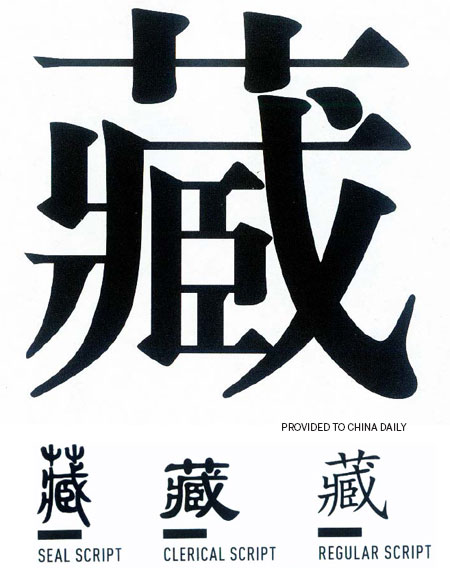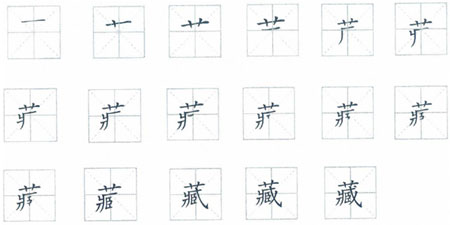From cang to zang
Updated: 2013-03-22 09:07
By Lao Huang and Xiao Chu (China Daily)
|
|||||||||||


Its history is full of hidden surprises, from prisoners to a pirate's lair 西藏的寻宝故事
All things Tibetan require a bit of 藏 (zàng). Take the region's main ethnic group (藏族 zàngzú) for instance, or the Tibetan language (藏语 zàngyǔ), Tibet's traditional calendar (藏历 zànglì), Tibetan medicine 藏医 zàngyī) or its wildlife (藏羚羊 zàng língyáng). But where did this suffix for "Tibet" (西藏 Xīzàng) come from?
In modern Chinese 藏 has two pronunciations: cáng and zàng. Cáng is a verb meaning "to hide"
(暗藏 àncáng), or "to collect" (珍藏 zhēncáng). An early example of this usage can be found in the Guanzi
(《 管子 》), an ancient encyclopedia named after the 7th century philosopher Guan Zhong (管仲).
The chapter entitled Chimi (《侈靡》) included a short passage which detailed things that everyone from the emperor down to lowly folk like you and I liked to collect:
"The emperors collect gems, princes collect epigraphy, the bureaucrats store livestock and the people store cloth." (天子臧珠玉,诸侯臧金石,大夫畜狗马,百姓臧布帛。Tiānzǐ zāng zhūyù, zhūhóu zāng jīnshí, dàifū xù gǒumǎ, bǎi xìng zāng bùbó.) In fact, the character has the same pronunciation, grapheme and meaning that is used in modern Chinese dating back to the Warring States Period (475 BC-221 BC).
In a chapter called Wangzhi (《王制》) from his imaginatively entitled collection of essays Xunzi (《荀子》), the Chinese Confucian philosopher Xunzi wrote:
"In spring, to sow; in summer, to farm; in autumn, to harvest; in winter, to collect." (春耕, 夏耘, 秋收, 冬藏。Chūngēng, xiàyún, qiūshōu, dōngcáng.)
However, when 藏 is pronounced zàng, like in the word "Tibet", it mischievously turns itself into a noun to mean "the place the treasures are stored away". So Tibet is filled with hidden treasures? Not so fast. 藏 was actually originally written without the grass radical 艹,thus dubbing it 臧 (zāng), which means "prisoners of war" - not so attractive sounding now, huh?
This is an archaic meaning, however, and ironically the most commonly used connotations of 臧 today are "good" or "kind." The written phrase 臧否 (zāngpǐ), 臧 meaning "to praise" and 否 meaning "to criticize" is, for example, used to say 臧否人物 (zāngpǐrénwù), or "to judge other people".
As you have probably ascertained by now, multiple interpretations of the same character can get confusing, which is why the 艹 radical was later added to help differentiate the lexicon.
Because the character has two meanings, people often mispronounce it. For example: some mistakenly say bǎocáng when they mean bǎozàng (宝藏 treasure and wealth), and jiàozàng instead of jiàocáng (窖藏, to store liquor or vegetables).
However, the difference really is simple. When used as a verb or adjective, 藏 is pronounced cáng, such as the movie title "卧虎藏龙" (Wòhǔ Cánglóng, Crouching Tiger, Hidden Dragon).
It also helps that cáng is much more commonly used in modern Chinese than zàng. 金屋藏娇 (jīnwūcángjiāo) is used to describe when "a man arranges a gorgeous house for his secret lover", or in layman's terms: "to have a mistress". The idiom 笑里藏刀(xiào lǐcáng dāo) means "a smile tinged with hidden viciousness", or "velvet paws hide sharp claws". 包藏祸心 (bāocáng huòxīn) is a way to say "to connive" or "to shield bad intentions", while you can use 藏头露尾 (cángtóu lùwěi) to mean "your head is hidden, but your tail sticks out", or, in other words, "you can't hide completely". So when in doubt, it is probably pronounced cáng unless you are referring to the extensively used word 宝藏.
So from prisoners of war and treasure troves to collecting pieces of old cloth, we arrive at a modern character, universally relevant to Tibet. Just mind your c's and z's!
Pronunciation: zàng and cáng
Strokes: 17
Radical: 藏
Used in the words:
bǎozàng
宝藏
treasure and wealth
zhēncáng
珍藏
to collect
Translated by Liu Jue.
Courtesy of The World of Chinese, www.theworldofchinese.com
The World of Chinese
(China Daily 03/22/2013 page27)
Today's Top News
List of approved GM food clarified
ID checks for express deliveries in Guangdong
Govt to expand elderly care
University asks freshmen to sign suicide disclaimer
Tibet gears up for new climbing season
Media asked to promote Sino-Indian ties
Shots fired at Washington Navy Yard
Minimum growth rate set at 7%
Hot Topics
Lunar probe , China growth forecasts, Emission rules get tougher, China seen through 'colored lens', International board,
Editor's Picks

|

|

|

|

|

|





